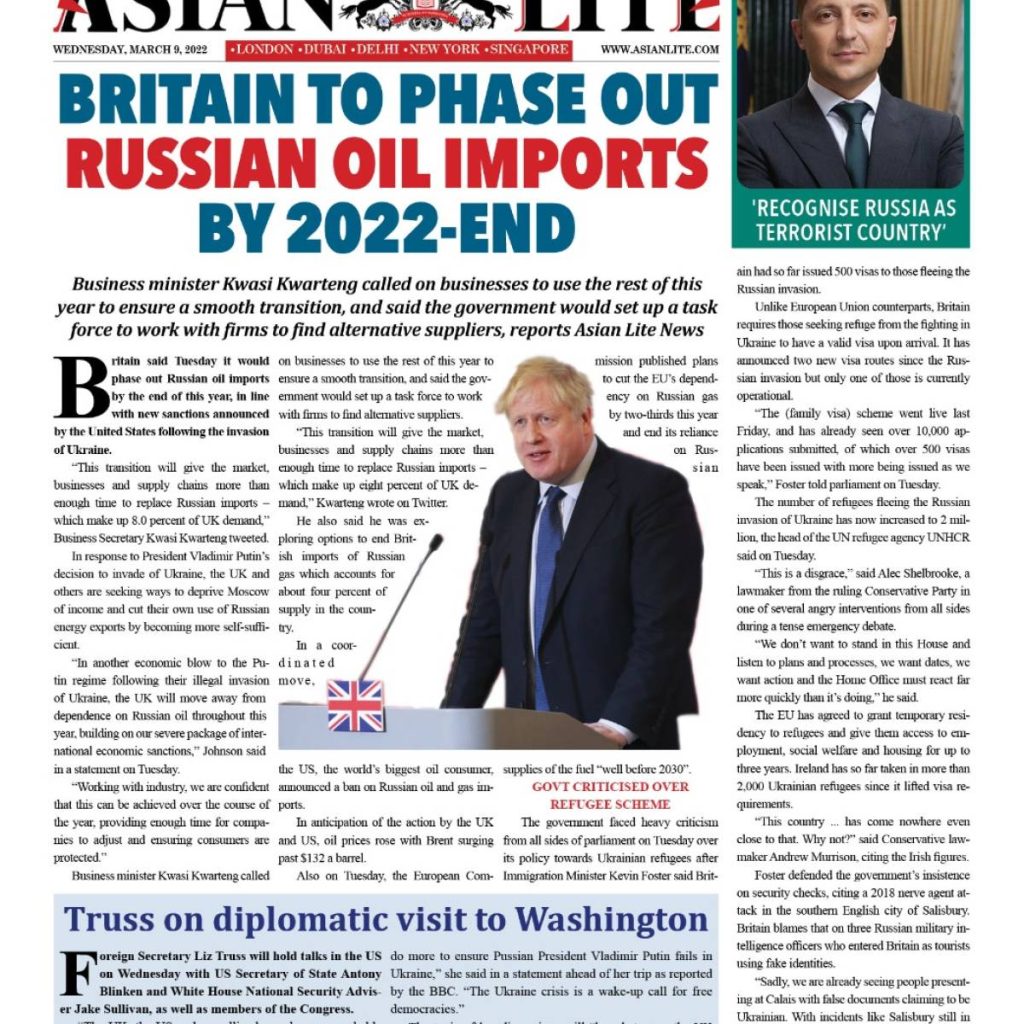Business minister Kwasi Kwarteng called on businesses to use the rest of this year to ensure a smooth transition, and said the government would set up a task force to work with firms to find alternative suppliers, reports Asian Lite News
Britain said Tuesday it would phase out Russian oil imports by the end of this year, in line with new sanctions announced by the United States following the invasion of Ukraine.
“This transition will give the market, businesses and supply chains more than enough time to replace Russian imports – which make up 8.0 percent of UK demand,” Business Secretary Kwasi Kwarteng tweeted.
In response to President Vladimir Putin’s decision to invade of Ukraine, the UK and others are seeking ways to deprive Moscow of income and cut their own use of Russian energy exports by becoming more self-sufficient.
“In another economic blow to the Putin regime following their illegal invasion of Ukraine, the UK will move away from dependence on Russian oil throughout this year, building on our severe package of international economic sanctions,” Johnson said in a statement on Tuesday.
“Working with industry, we are confident that this can be achieved over the course of the year, providing enough time for companies to adjust and ensuring consumers are protected.”
Business minister Kwasi Kwarteng called on businesses to use the rest of this year to ensure a smooth transition, and said the government would set up a task force to work with firms to find alternative suppliers.
“This transition will give the market, businesses and supply chains more than enough time to replace Russian imports – which make up eight percent of UK demand,” Kwarteng wrote on Twitter.
He also said he was exploring options to end British imports of Russian gas which accounts for about four percent of supply in the country.
In a coordinated move, the US, the world’s biggest oil consumer, announced a ban on Russian oil and gas imports.
In anticipation of the action by the UK and US, oil prices rose with Brent surging past $132 a barrel.
Also on Tuesday, the European Commission published plans to cut the EU’s dependency on Russian gas by two-thirds this year and end its reliance on Russian supplies of the fuel “well before 2030”.
Govt criticised over refugee scheme
The government faced heavy criticism from all sides of parliament on Tuesday over its policy towards Ukrainian refugees after Immigration Minister Kevin Foster said Britain had so far issued 500 visas to those fleeing the Russian invasion.
Unlike European Union counterparts, Britain requires those seeking refuge from the fighting in Ukraine to have a valid visa upon arrival. It has announced two new visa routes since the Russian invasion but only one of those is currently operational.
“The (family visa) scheme went live last Friday, and has already seen over 10,000 applications submitted, of which over 500 visas have been issued with more being issued as we speak,” Foster told parliament on Tuesday.
The number of refugees fleeing the Russian invasion of Ukraine has now increased to 2 million, the head of the UN refugee agency UNHCR said on Tuesday.
“This is a disgrace,” said Alec Shelbrooke, a lawmaker from the ruling Conservative Party in one of several angry interventions from all sides during a tense emergency debate.
“We don’t want to stand in this House and listen to plans and processes, we want dates, we want action and the Home Office must react far more quickly than it’s doing,” he said.
The EU has agreed to grant temporary residency to refugees and give them access to employment, social welfare and housing for up to three years. Ireland has so far taken in more than 2,000 Ukrainian refugees since it lifted visa requirements.
“This country … has come nowhere even close to that. Why not?” said Conservative lawmaker Andrew Murrison, citing the Irish figures.
Foster defended the government’s insistence on security checks, citing a 2018 nerve agent attack in the southern English city of Salisbury. Britain blames that on three Russian military intelligence officers who entered Britain as tourists using fake identities.
“Sadly, we are already seeing people presenting at Calais with false documents claiming to be Ukrainian. With incidents like Salisbury still in our minds, the government will not take chances with the security of this country and our people,” he said.

The government has also struggled to explain what support it is offering to migrants arriving in the French port of Calais after a diplomatic spat with France on Sunday, when Paris said refugees without visas were being turned away.
Britain rejected that criticism, saying it had staff operating in Calais and had set up a visa application centre en route to the port. That centre was later announced to be in Lille, around 70 miles away, and had not yet opened.
“It is essential we do not create a choke point at places like Calais where there are dangerous people smugglers present but also to ensure the smooth flow of people through the system from across Europe,” Foster said.
“We’ve made significant progress in a short space of time.”

Leave a Reply